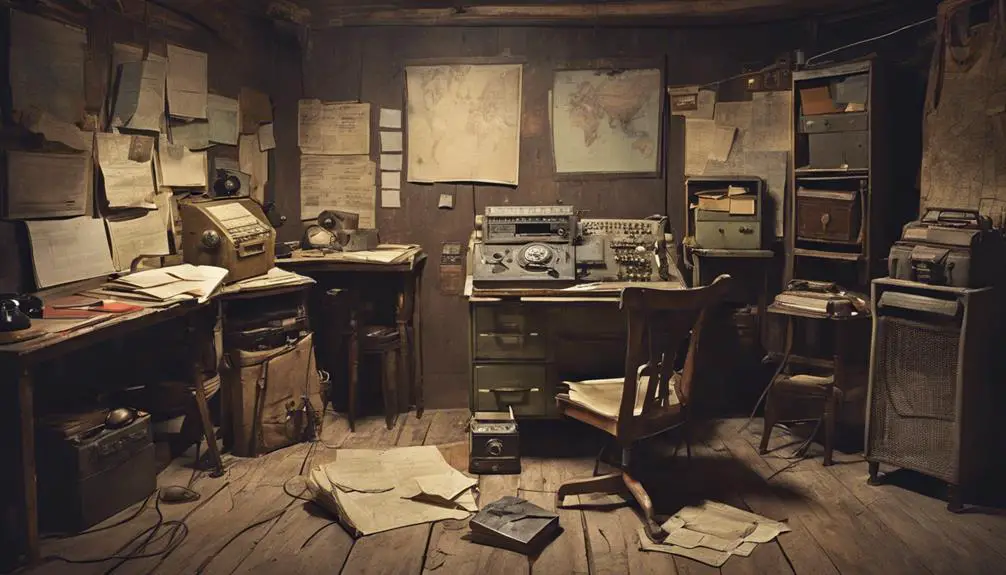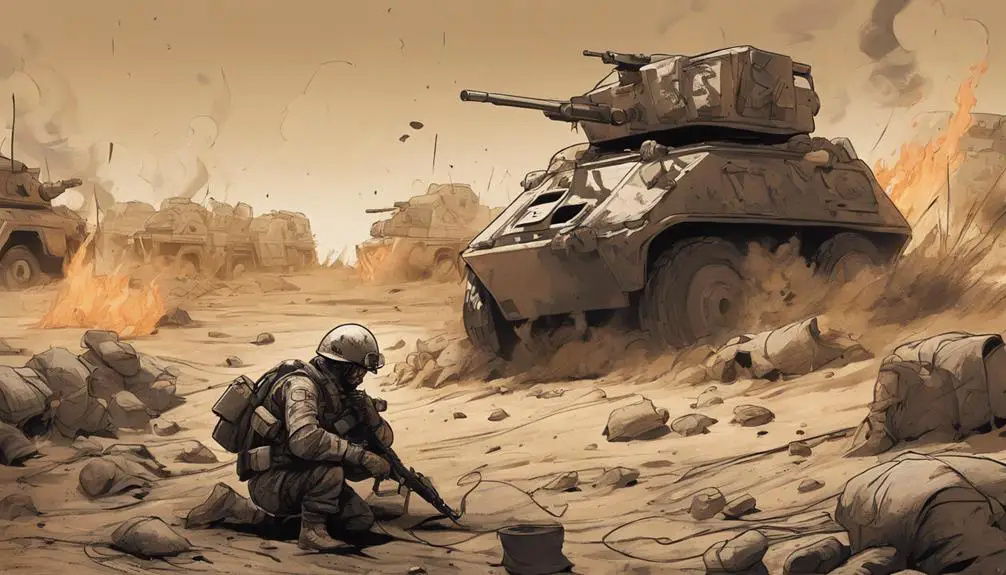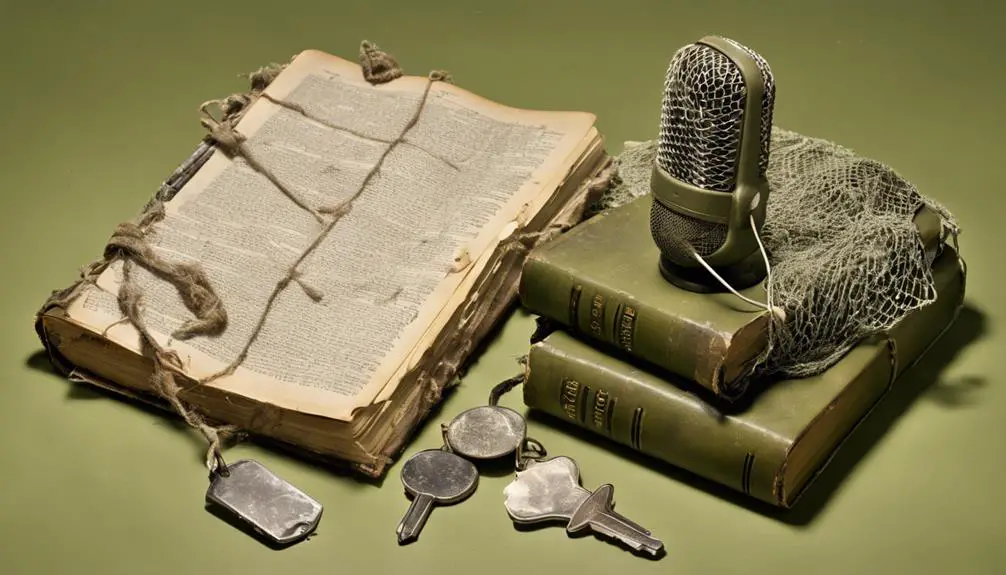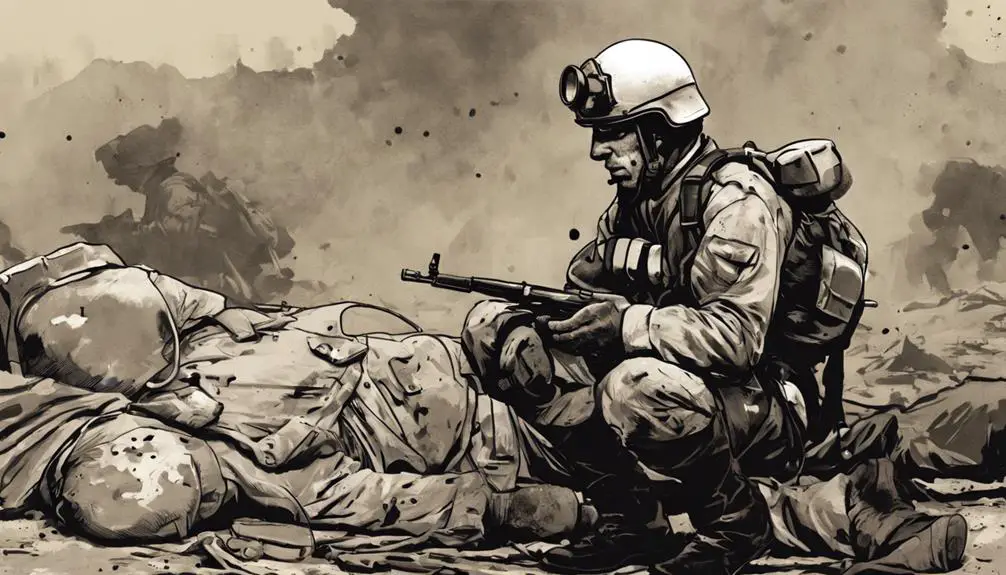You've heard "Code Blue" announced over a hospital intercom, but did you know this critical alert system has its roots in military slang from World War II? The term originated from a system of color-coded alerts used during wartime, which was later adopted by hospitals in the 1950s and 60s. Military slang emphasizes practicality and brevity, with a blend of formal and informal language. Code Blue's evolution is just one example of how military jargon influences our everyday language. As you explore the story behind Code Blue, you'll uncover a rich history that reveals the fascinating dynamics of military communication.
Origins of Code Blue Slang

You're likely familiar with the phrase 'Code Blue' from medical dramas on TV, but have you ever wondered where this term originated?
The phrase 'Code Blue' has a rich Military Heritage, rooted in its Historical Context. During World War II, the US military used color-coded alerts to signal different types of emergencies. 'Code Red' signified a fire, while 'Code Blue' indicated a medical emergency. This system was developed to quickly convey critical information without causing panic among patients and staff.
In the 1950s and 60s, hospitals adopted this military-inspired system, adapting 'Code Blue' to signal a cardiac arrest or other life-threatening situation. The term stuck, becoming an integral part of medical lingo.
Today, you'll hear 'Code Blue' announced over hospital intercoms, signaling a medical emergency that requires immediate attention. While the phrase has evolved, its Historical Context remains, a reflection of the historical background in which it was born.
Decoding Military Lingo
When deciphering military slang, it's important to acknowledge that the language is often rooted in practicality and brevity, with terms like 'Code Blue' emerging from a need for clear and concise communication in high-stress environments.
As you explore the world of military lingo, you'll notice that it's not just about using cool slang – it's about understanding the cultural nuances and linguistic barriers that come with it. Here are a few key takeaways to keep in mind:
- Linguistic flexibility: Military slang often blends formal and informal language, making it essential to be adaptable in your communication approach.
- Cultural context: Be aware of the cultural nuances behind certain terms, as they can vary greatly depending on the unit, branch, or region.
- Brevity is key: Military slang is all about concise communication, so be prepared to get straight to the point.
- Context is everything: Understanding the situation and context in which a term is used is crucial to decoding military lingo accurately.
Slang in Combat Zones

In the heat of combat, soldiers rely on a unique set of slang terms to communicate vital information quickly and accurately. You'll hear phrases like 'Get some!' or 'Let's roll!' used as Battle Cries to pump up troops before a mission or to signal the start of an operation. These phrases become a rallying cry, boosting morale and focus in high-pressure situations.
In the midst of combat, every second counts, and clear communication is key. That's why soldiers use slang terms to convey complex information in a concise manner. Foxhole Chats, for instance, refer to casual conversations between soldiers during downtime in their foxholes. These chats often involve sharing stories, jokes, or rumors, helping to relieve stress and build camaraderie.
In combat zones, slang terms serve as a shorthand language, enabling soldiers to swiftly exchange critical information about enemy positions, mission objectives, or changes in the battlefield. By using these terms, you can quickly grasp the situation and respond accordingly, making all the difference between success and failure in a high-stakes environment.
Code Blue in Pop Culture
Beyond the battlefield, the phrase 'Code Blue' has taken on a new life in popular culture, where it's often used to add a touch of authenticity to medical dramas and action movies. You've probably heard it uttered by a harried TV doctor, rushing to save a patient's life in a medical drama.
The phrase has become synonymous with high-stakes medical emergencies, and its use in popular culture has helped to cement its place in the public consciousness.
Here are just a few examples of 'Code Blue' in popular culture:
- House M.D.: Dr. Gregory House's team frequently calls a 'Code Blue' when a patient's life is on the line.
- ER: The classic medical drama often featured 'Code Blue' situations, where doctors and nurses rushed to save patients' lives.
- The Resident: This medical drama also uses the phrase to add realism to its portrayal of hospital life.
- Grey's Anatomy: The long-running medical drama frequently features 'Code Blue' situations, often with dramatic consequences.
Evolution of Military Jargon

You've likely wondered how military slang like 'Code Blue' originated and evolved over time, and the answer lies in the dynamic nature of military jargon. Military language has always been shaped by the unique experiences and environments of soldiers.
The Military Legacy of slang terms like 'Code Blue' can be traced back to World War I, when soldiers used coded language to communicate secretly. This Linguistic Isolation from the civilian world allowed military slang to develop independently, influenced by cultural and geographical factors.
As military operations expanded globally, linguistic exchange between troops from different regions and countries further enriched military jargon. The evolution of military slang is a continuous process, driven by the need for brevity, clarity, and secrecy in high-stress environments.
New terms emerge, while old ones fade away, reflecting the adaptability of military language. You'll find that this dynamic nature of military jargon has given rise to a rich and diverse vocabulary, including terms like 'Code Blue', which have become an integral part of military culture.
Secret Language of Warriors
As you explore the secret language of warriors, it becomes clear that military slang like 'Code Blue' serves as a badge of honor, distinguishing those who've earned the right to speak it from those who haven't. This unique dialect is woven into the fabric of warrior culture, fostering a sense of camaraderie and shared experience among those who've served.
Here are a few ways military slang reinforces the bonds of warrior culture:
- Exclusive language: Military slang creates a sense of exclusivity, separating those who've served from those who haven't.
- Code dependence: Relying on codes and abbreviations like 'Code Blue' promotes a sense of dependence on fellow warriors who understand the language.
- Shared experience: Military slang is often born from shared experiences, creating a sense of unity among those who've faced similar challenges.
- Badge of honor: Using military slang is a way for warriors to showcase their service and pride in their accomplishments.
Frequently Asked Questions
Is Code Blue Slang Only Used in the US Military?
You're wondering if 'code blue' slang is exclusive to the US military.
Not quite! While it originated in the US, specifically in hospitals, 'code blue' refers to a medical emergency.
Its military origins are unclear, but it's widely used globally. International counterparts, like Canada and Australia, also utilize 'code blue' in medical contexts.
Can Civilians Use Code Blue Slang in Casual Conversations?
You're wondering if you can casually drop 'code blue' in everyday conversations. Think of language as a cultural garden – you can borrow seeds, but be mindful of their roots.
Using military slang without understanding its origins can be seen as cultural appropriation. Before adopting 'code blue' into your everyday language, consider its history and respect its military heritage.
Use it thoughtfully, and you'll avoid cultural insensitivity.
Are There Regional Differences in Code Blue Slang Usage?
You might wonder if regional differences exist in slang usage. Yes, they do! Geographic variations in language use are shaped by cultural influences.
Regional accents, local customs, and historical events all contribute to unique dialects. You'll find distinct slang patterns in different parts of the country, reflecting local culture and history.
For instance, New York City's slang is distinct from California's, and Southern states have their own flavor.
Is Code Blue Slang Limited to Enlisted Personnel Only?
You might assume that certain slang terms are exclusive to specific ranks, but that's not always the case. When it comes to Code Blue, you'll find that it's not limited to enlisted personnel only. Officers are also aware of this term, and its usage isn't restricted by rank.
In fact, Code Blue is a widely recognized term that transcends rank exclusivity, and its awareness spans across the military hierarchy.
Can Code Blue Slang Be Used in Formal Military Communications?
You'd think formal military communications would be the last place you'd find slang, but surprisingly, it's not entirely off-limits.
When it comes to using informal language in official channels, the answer is a resounding 'no.' Formal language is crucial in military communications to guarantee clarity and precision.
Official channels demand professionalism, and using code blue slang in formal reports or briefings would be out of place. Stick to standard, clear language to avoid confusion and maintain credibility.
Conclusion
As you explore the world of military slang, you've deciphered the cryptic code of 'Code Blue.' This enigmatic phrase, born from the trenches of combat, has evolved into a symbol of urgency and danger.
From the fiery frontlines to the silver screen, Code Blue has pierced the pop culture sphere. Embracing its mystique, warriors wield this secret language, forging an unbreakable bond among brothers in arms.
In the domain of military jargon, Code Blue remains an enduring enigma, forever etched in the lexicon of war.







